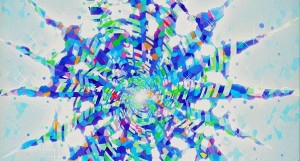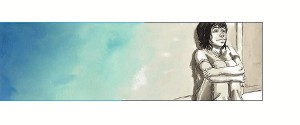“The Best of 2002”
Por Don MacPherson & Randy Lander
Publicado originalmente en The Fourth Rail dot com, 2002.
– – – – – – – – – –
Join Don MacPherson and Randy Lander as they take a look at their picks for the Best of 2002, starting with notable series and issues.
Randy: Quite honestly, I had gotten the feeling that 2002 was a weaker year overall than 2001, which was a banner year for comics in my eyes. However, a continued slate of great books by Marvel, a seemingly reinvigorated DC and strong performances from Oni, Image and a variety of new self- or small- publishers made the decision-making for the “Best Of” 2002 pretty difficult. In fact, there are more than a few names not on here that were painful to cut out.
Don: Confession time… while I enjoy writing these “Best of” features, I also dread them a little. There’s just no way that Randy and I can cover and read all of the great comics released in a year, let alone remember everything we looked at in the course of the year. I’m always worried some books and creators will go overlooked… and I’m sure we do miss some. Keep that in mind, especially if you’re in the process of writing an e-mail that starts with the words, “But what about…?”
Enough ass-covering. On with the show…
Best First Issue
Randy: These days, with the rising costs of comics, you’ve got to hook the readers with the very first issue, or they might not come back for the second. The days of the “three issue trial,” while not entirely in the past, are certainly seeing the big meteor headed for their planet. This category is for those books that grabbed us right from the start with a terrific first issue.
This was a good year for anthologies, at least as far as I was concerned. The first issue of the full-color, magazine-sized anthology Comiculture knocked my socks off, and was a great example of what can be done with comics outside the usual formats that we see. I was also really impressed with the first issue of Raijin Comics, an enormous package of manga comics from publisher Gutsoon! that had a wide spread of genres and an impressive variety of stories and talent. The independent publishers also served up a couple pleasant surprises with Paradigm #1 (which was impressive enough to land a spot at Image) and Halo & Sprocket #1, which is in the running for the funniest comic I read all year. Oni Press had more than a few strong debuts as well, notably Queen & Country: Declassified #1 and Courtney Crumrin & The Coven of Mystics #1.
Which is not to say that the majors were lacking in impressive debuts, although perhaps not so many as 2001 offered. Ultimates #1 served notice of what to expect from that series, great artwork and over-the-top style, although it didn’t foreshadow the erratic publishing schedule. Global Frequency #1 was some of Warren Ellis’ strongest work in some time, a great introduction to an action-adventure concept with solid artwork from Garry Leach, and a self-contained issue to boot. Image makes the list with Defiance #1, a strong first issue for the beautifully-drawn fantasy/science-fiction book and Hawaiian Dick #1, one of the best early Christmas presents I received this year from the comics industry.

Don: Not too surprisingly, I agree with many of Randy’s choices above. And he’s right… a first issue really has to grab a reader these days. Bill Willingham definitely achieved that laying the groundwork for a magical world amid our own in Fables #1. Ted Neifeh’s Courtney Crumrin was one of 2002’s most delightful debuts, which is why I’m picking the first issue of the first limited series—Courtney Crumrin & The Night Things—over last month’s The Coven of Mystics #1.
Randy: In the end, though, my choice for best first issue of the year is a no-brainer, because Y: The Last Man #1 exceeded all my expectations and just blew me away. That the series has lived up to the promise implied in the first issue is no small feat.
Don: I suspect this will be the first of many times that we are in complete in agreement for the top pick in a given category. After a few solid years, writer Brian K. Vaughan finally broke out and proved to the entire industry that he is one of the most important new creative voices in comics, and he did so with a compelling first issue that made it clear that Y: The Last Man wasn’t going to be about just one man, but about the entire planet.
Best New Series
Don: One of the problems with these “Best of” things is narrowing things down. There’s a lot of good work that merits mention, and for some categories, it’s overwhelming. Best New Series isn’t one of them. First of all, the ongoing series seems to be a dying animal, as the industry shifts toward series of limited series. So it’s easy to think of those few new ongoing titles that really grabbed one’s attention and never let go.
The most mainstream of the year’s best new ongoing books was the fourth in Marvel’s Ultimate line: Ultimates. Millar and Hitch are doing so much more than just dusting off the Avengers concept for a new millennium. They’re examining how image-oriented Western culture has become. Ultimates is as much about politics and public relations as it is about powers.
On the other end of the diversity spectrum is My Monkey’s Name Is Jennifer. Ken Knudtsen’s bizarre tale of a homicidal monkey and his innocent owner is difficult to describe, but easy to enjoy. I hope 2002 brings a trade paperback edition of the first few issues so it can reach a new, wider audience. Speaking of homicide and animals, Fables is a book that made people sit up and take notice of DC’s Vertigo imprint once again. Willingham’s mix of black comedy, mystery and the premise’s innocent foundation make for a thoroughly entertaining read every month.
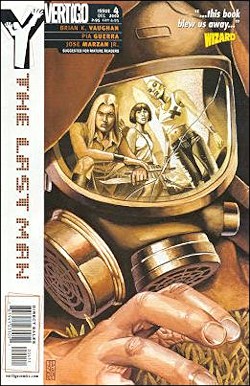
Randy: Of course, all three of the books you named above are on my Best Of list this year as well, although Jennifer was a book that took me far too long to discover. It was a good year for Slave Labor, because also making my list is the wonderfully quirky and funny Halo & Sprocket, which is sporadically published but always worth the wait. Ditto Fade From Blue, which started out looking like a slice-of-life book and quickly developed a quirky style of its own.
DC also had a couple other series that struck a chord with me, one that resonated with other readers (Hawkman) and once that sadly seems to be striking a sour sales note (The Resistance). Ironically enough, the lesser selling title is currently the one that grabs my attention more fully. Crossgen also introduced what was for me their strongest series so far, the Ang Lee directs Jackie Chan style comic Way of the Rat. And speaking of the Far East, Raijin Comics didn’t let up after a strong first issue, quickly landing the weekly series on my must-read list.
In a move certain to cause some deja vu amongst those reading this in order, though, my pick for Best New Series goes to Y: The Last Man. It is just now starting its second story arc, and seems poised to continue meeting or exceeding my high expectations.
Don: Again, we’re on the same page. Y: The Last Man was easily the best new title in 2002, and one of the creative highlights of the year.
Best Story Arc
Randy: With the increasing trade production, there’s been an even stronger focus on story arcs which can be neatly contained in one package, and a lot less long-running subplots and character arcs. While there’s certainly room for the endless soap opera style that has long characterized super-hero comics or the long-form uber-arcs of books like Transmetropolitan, Preacher or Age of Bronze, the fact is that you can very often judge a book based on very strong or very weak story arcs.
Surprising no one who knows my tastes, Brian Michael Bendis makes this list no less than three times. The relatively short but surprising “Anarchy” storyline in Powers #21-24, the fun and funny twisting story of “Sidekick” in Alias #6-9 and the “Public Scrutiny” arc that ran through Ultimate Spider-Man #29-32 all made my short list of best stories this year. Also enjoying strong arcs later in their run were Catwoman, where the “Disguises” arc in issues 6-9 actually surpassed the opening story, Queen & Country with the “Crystal Ball” arc in #8-12 that took on the notion of anti-terrorism espionage in a post-9-11 world and Birds of Prey #44-46, which was a return to form for departing creator Chuck Dixon and had fantastic artwork by Dave Ross. Exiles also had its strongest story to date with “A World Apart” in #8-10.
Then there were the opening arcs, and there were some strong ones there as well. Gail Simone and Udon Studios kicked off a woefully short and funny run on Agent X with “Dead Man’s Switch” in #1-6, and Mark Millar, Bryan Hitch and the rest served up widescreen super-hero action the way it should be in Ultimates #1-6. In addition, Vertigo had a great second half of the year, launching not one but two new slam dunk stories with “Legends in Exile” (Fables #1-5) and “Unmanned” (Y: The Last Man #1-6).
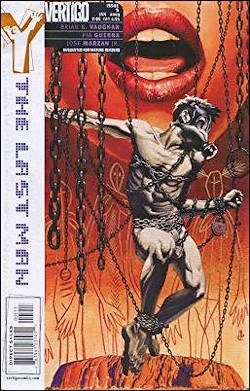
Don: Once again, we’re in agreement to some extent. Bendis made my list three times as well. Ultimate Spider-Man’s “Public Scrutiny” was wonderful. Alias made my list as well, but for “Come Home” in issues 11-15. And finally, “Out,” the Daredevil arc in which the title character copes with the revelation of his secret identity, was another Bendis achievement.
I also agree that the opening story arcs in Y: The Last Man and Fables were fantastic, as was the first few issues of Ultimates. Also meriting mention is the recent Asgard-on-Earth storyline in Thor. Writer Dan Jurgens has done what I had thought was impossible: he made the God of Thunder matter. And Alan Moore’s exploration of magic, science and spirituality in Promethea opened my eyes and instilled a sense of intellectual wonder.
Randy: It’s an extremely difficult decision to make, but I think my favorite story arc this year was “Unmanned,” which delivered on the promise of a great first issue and had me anxiously awaiting each new issue to see what would happen at the end of the latest surprising cliffhanger.
Don: Again, when it comes down to picking one over all the others, I concur. That first Y story arc offered some powerful and thought-provoking storytelling.
Best Single Issue
Don: This is an incredibly tough category. Even titles that don’t leap to mind as my absolute favorites boast an issue here and there that really tap into the concept’s and creators’ full potential. And then there are those books that always capture the imagination that have their outstanding single issues as well.
The first that comes to mind is the recent The Red Star Annual #1. The regular title publishes infrequently, and this one-shot not only served as a nice refresher course on this off world of war, science and sorcery, but told a compelling human story with some stunning artwork. Another one-shot that combines a strong script with inventive, unusual artwork was Hip Flask: Unnatural Selection. Richard Starkings, Joe Casey and Jose Ladronn surprised me by playing the premise straight. I expected parody but found compelling science-fiction drama.
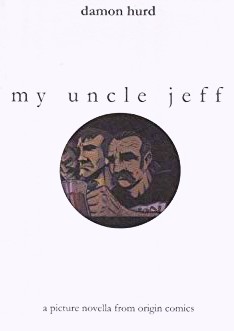
While the series hasn’t quite held up to the same standard, Captain America #1—John Ney Rieber and John Cassaday’s reaction to the World Trade Center terrorist attacks—was a touching tribute and boasted some awe-inspiring, realistic but stark artwork. Another Marvel offering that stood out in 2002 was the goofy comedy-noir of “Open All Night,” Darwyn Cooke and J. Bone’s contribution to Spider-Man’s Tangled Web (issue #11, for those who haven’t checked it out yet).
Randy: Oddly enough, we haven’t found as much common ground in this category. Though I enjoyed Captain America #1 at the time, in hindsight it’s nowhere near as good as I gave it credit for. I will agree with you about “Open All Night,” though… fun stuff. When it comes to Spider-Man, I was also partial to “The Conversation” (Amazing Spider-Man #38) and Ultimate Spider-Man Special #1, which capped off the Ultimate Marvel Team Up series in fine form.
Though it’s cheating to some degree, each issue of Halo & Sprocket and True Story Swear to God is enjoyable as a standalone, and of such high quality, that every single issue of those series released in 2002 (three each) made my list of contenders. Slave Labor also had a couple one-shot contenders, whether it’s the annual fun-fest of Dork (#10 this year) or the promising debut of 80s nostalgia/parody book Babyhead Magazine. And I know we both enjoyed Image’s The Pro, which we both thought was absolutely hysterical.
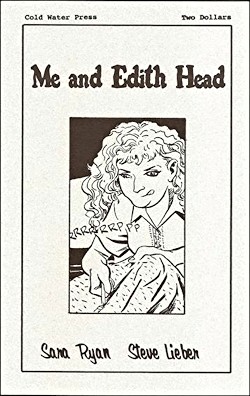
Don: My pick for the Best Single Issue of 2002 is an unusual one, though. Thanks to this whole reviewing thing, I was lucky enough to get a look at a mini-comic called My Uncle Jeff. This real-life look at family dysfunction—written by Damon Hurd and illustrated by Pedro Camello—was not only an impressive debut by two new creators, but wowed the reader with its unflinching honesty. Actually, I’m cheating a little by selecting this one as my top pick, because a regular comic-book edition of My Uncle Jeff is slated for release in February. Do yourself a favor and pick it up (and pre-order it or your shop likely won’t get it in).
Randy: A good year for the mini-comic, then. You are cheating, by the way, because the mini-comic version of My Uncle Jeff that we read in 2002 isn’t its final format, as you note… I feel certain it’ll be in contention for my Best of 2003. In the meantime, there’s another mini-comic that was produced in 2002 that overcomes some strong competition to serve as the Best Single Issue of 2002 in my eyes: Me and Edith Head, by Sara Ryan and Steve Lieber. This story of coping with parental divorce and finding your own identity in high school was amazing, especially considering that it was Ryan’s comic-writing debut.
Best Limited Series
Randy: Wow, was this ever a great year for limited series. Of all the categories, this is the one that was the hardest to pare down, and I would recommend to any of you seeking out a good self-contained read that you take a quick flip through the archives of this year’s reviews and check out some of the short run gems that were produced in the industry this year.
Don: As I noted above, though, the industry seems to be shifting to series of limited series, making for any more potential “nominees” in this category than what we might have found a few years ago.
Randy: Of course, there’s good, and then there’s the cream of the crop. As usual, Oni really handles itself well in limited series form, and they had several new properties to fall in love with this year. Courtney Crumrin & The Night Things looked at first glance like a “goth” series that wouldn’t strike my fancy, but it turned out to be one of my favorite reads of the year, and Skinwalker was a great crime/road movie story that hearkened back to Oni’s early days of Whiteout as well as serving as terrific sophomore efforts for the creators involved.
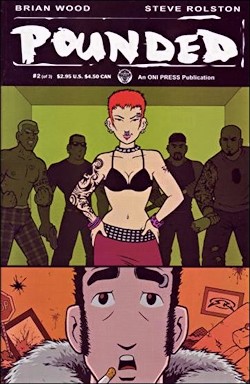
Don: Oni Press is undoubtedly the king of the limited series (and of genre diversity). Hopeless Savage: Ground Zero—by Jen Van Meter and Bryan O’Malley—was a thoroughly touching story about young love and conflict between parent and child. We also saw the first two issues of the three-issue Queen & Country: Declassified series in 2002, in which Greg Rucka and Bryan Hurtt offered up some character-driven Cold War nostalgia.
Randy: Vertigo, always the home of at least a few good minis as well, turned out two that really impressed me this year. Neither of them are completed yet, so I can’t fully judge them, but the initial issues of Paul Pope’s 100% have been probably my favorite of any of his work that I’ve sampled thus far. In addition, both Peter Milligan and Phillip Bond are working at the top of their game with the tale of a washed-up rockstar trying to recapture his youth in the clever and funny (if uninterestingly named) Vertigo Pop! London.
Don: I’m digging London as well… not to mention Vertigo’s other limited series. Sandman Presents: The Thessaliad supplied the Bill Willingham fix I craved before the launch of Fables, and while I didn’t connect with The Invisibles, Grant Morrison has succeeded in sucking me into his twisted mind with the surreal and intense The Filth. Also meriting mention in this category is a title from Slave Labor: Slow News Day. The latter half of Andi Watson’s slice-of-life story of a small-town newspaper and two employees was released in 2002, and it was just as powerful as 2001’s Breakfast After Noon.
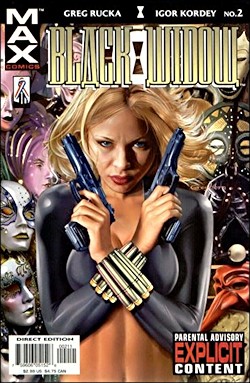
Randy: Not to be outdone, Marvel came on strong with mini-series early this year. Elektra & Wolverine: The Redeemer, an illustrated novel in three parts by Greg Rucka and Yoshitaka Amano, took two characters I don’t have much innate interest in and delivered one of the most gripping espionage/crime/action reads I’ve had all year. Bill Rosemann took off his public relations hat and put on his writing togs to serve up the terrific tale of journalism in the Marvel Universe that was Deadline. Jeff Jensen stepped away from his role as a critic to create X-Factor, a fascinating political and philosophical examination of Marvel’s mutants. Brian Vaughan complimented his strong work on Y: The Last Man with an exploration of the underside of the Marvel Universe with The Hood. And Greg Rucka scored twice, first with Black Widow: Pale Little Spider (some of Igor Kordey’s finest work this year) and Ultimate Daredevil & Elektra (some of Salvador Larroca’s finest work).
My favorite mini-series of the year, however, was another Oni series. Pounded was a story of punk rock, posers, rocky romance and questions of identity and it offered up terrific characterization, plenty of laughs and fantastic artwork. Brian Wood, Steve Rolston and Oni have plenty to be proud of with this series.
Don: Definitely a worthy choice, but I think I have to give the nod to Black Widow: Pale Little Spider. It’s disturbing true-crime, politics and strong, extreme characterization really impressed.
Best Ongoing Series
Don: Another category, so it must be time to mention Bendis again. Alias, Ultimate Spider-Man and Daredevil all stood out as some of the best titles of 2002. They’re consistently entertaining, inventive and resonant. And those are qualities that one can find in a number of the industry’s best books.
Tom Beland’s True Story Swear to God only saw three issues published in 2002, but they were three of the best comics out there last year. His romance/comedy book’s greatest strength was its honesty. CrossGen’s Meridian—a seamless blend of fantasy, politics and coming of age—definitely deserves to make the list, as does Alan Moore and J.H. Williams’s Promethea. Greg Rucka is one of the industry’s top writing talents at the moment, and his best work of 2002 was in Queen & Country from Oni Press.
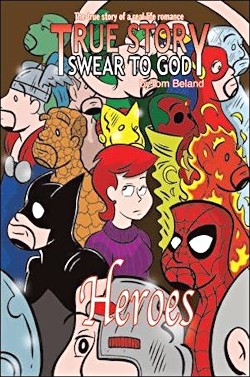
Randy: Queen & Country is on my list as well, and of course I’m with you on the Bendis books, but I’d add Powers to that list, as well as a few other series. Age of Bronze continues to provide something completely different from what most comics offer, a well-researched and scholarly story of history that is nevertheless highly entertaining. Catwoman seems to get stronger with each arc and also manages the impressive feat of topping the excellent artists departing with new artists that are as good or better for the book. Lucifer also had some impressively solid epic stories this year, building on the framework that Mike Carey has established in previous years.
On the more traditional super-hero side, Geoff Johns had a very good year with JSA and The Flash, and Bendis wrote one of my favorite arcs in Ultimate Spider-Man. Grant Morrison’s off-kilter New X-Men, even with a variety of rotating artists, also managed to impress more often than not. And though I’m a little leery of the long-winded pacing, I continue to find myself drawn to Bruce Jones’s Incredible Hulk.
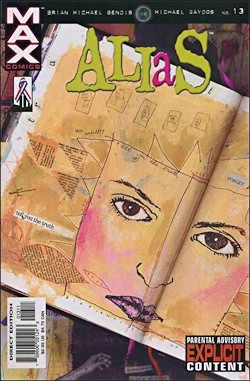
My favorite ongoing series, though, is one that only had three issues, but which never failed to overpower me every time it came out. I’m speaking of True Story Swear to God, and you nailed the strengths of the book, as it’s the mixture of honesty and comedy that made it my favorite.
Don: I was leaning in the direction of True Story as well. It’s a tough choice, but I think I have to go with Alias, as there was just more of it to enjoy in 2002. Brian Michael Bendis and Michael Gaydos’ noir journey through the periphery of the Marvel Universe is not to be missed, be it in episodic form or collected editions.
Best Original Graphic Novel
Randy: We close out part one of this feature with a new category. I’ve found my reading interests shifting toward the graphic-novel format, and I’d often rather have something with a spine than a bunch of books that can get shoved into a box and all too often forgotten. So I was quite pleased with the increased production of collected editions from many publishers this year, as well as an explosion in excellent works that went straight to graphic novel format.
Don: I have a little trouble with this category. I didn’t read nearly as many original graphic novels in 2002 as I would have liked. There are several highlights that I haven’t had a chance to read yet, so keep that in mind when I offer up my picks (which are still great OGNs, mind you).
Randy: There are some publishers that have moved to a 99 percent (or even 100 percent) graphic-novel production, and two of those companies produced some of my favorite works this year. Larry Young has earned a reputation for rescuing underpromoted and underappreciated projects, and one such was Abel, the story of a Depression-era boy and his brother that is as hard to describe as it is to put down once you’ve started reading it. Then there was the AIT/Planet Lar production of Sky Ape: Waiting for Crime, which was even more funny and a little more lucid than the first trade in that series. Top Shelf Productions also had some major hits for me this year, whether it was Doug TenNapel’s delightfully weird Creature Tech or Rich Koslowski’s equally weird and surprisingly dark “comics documentary” Three Fingers.
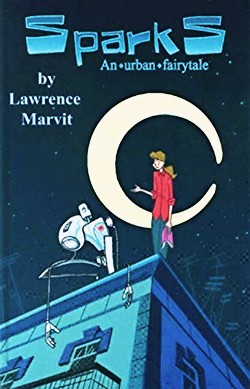
Though they came out of a tragedy, comics creators and publishers rose to the occasion with no less than three spectacular volumes examining the fallout of 9-11, whether it was Alternative Comics’s 9-11: Emergency Relief or the two-volume set of 9-11 by DC, Dark Horse, Image and any number of other publishers and independent creators. Less weighty but also very well done were Chuck Dixon’s tribute to 1950s alien invasion flicks with IDW’s Invasion ‘55, Andi Watson’s ruminations on relationships in Oni’s Dumped, the slayers through the ages stories in Dark Horse’s Buffy the Vampire Slayer: Tales of the Slayers and Viz’s eye-opening and stomach-turning horror manga Uzumaki, which saw the second and third volumes published in 2002.
DC also came on strong with the original hardcovers this year. There were many of them produced, but the ones that stood out in my mind were Darwyn Cooke’s heist flick on paper Catwoman: Selina’s Big Score, the first glimpse of Greg Rucka’s take on Wonder Woman in Wonder Woman: The Hiketeia or one of the best super-hero crossovers of the year in JLA/JSA: Virtue and Vice. My favorite original graphic novel of the year, however, was the monster-sized collection of Lawrence Marvit’s Sparks from Slave Labor Graphics. Completing his Eisner-nominated series in graphic-novel format resulted in a touching, powerful and fantastic story that has me anxiously awaiting Marvit’s next foray into comics.
Don: Randy touched on a number of my picks. Selina’s Big Score was a deliciously fun heist story; if you missed the hardcover, be sure to keep an eye out to see if DC offers a less expensive softcover version. Of all the Sept.11 tribute material, 9-11 Volume One stood out as the most powerful… and the most experimental. Andi Watson never seems to miss these days, and Dumped carried on the trend begun with Breakfast After Noon and Slow News Day.
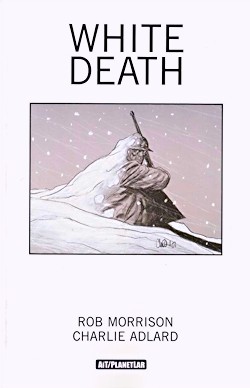
Another reason I’m uncomfortable with this category is that there are projects that are reprints, but the presentation and marketing really place them as original, new works. One of those was Warren Ellis’s Atmospherics. It puts The X-Files to shame when it comes to the subjects of alien visitation and conspiracy theories. And the afore-mentioned AiT/Planet Lar’s best offering of 2002 was a retooled and invigorated edition of White Death. “Eligibility” concerns aside, that stark, cold war story earns my nod for the Best Original Graphic Novel of 2002.

